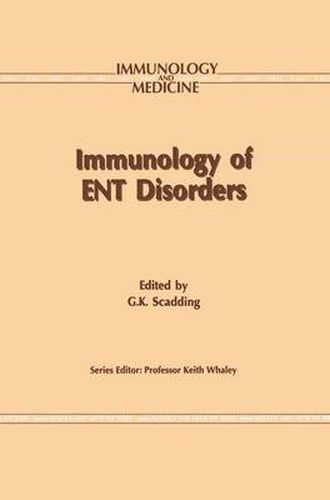Readings Newsletter
Become a Readings Member to make your shopping experience even easier.
Sign in or sign up for free!
You’re not far away from qualifying for FREE standard shipping within Australia
You’ve qualified for FREE standard shipping within Australia
The cart is loading…






This title is printed to order. This book may have been self-published. If so, we cannot guarantee the quality of the content. In the main most books will have gone through the editing process however some may not. We therefore suggest that you be aware of this before ordering this book. If in doubt check either the author or publisher’s details as we are unable to accept any returns unless they are faulty. Please contact us if you have any questions.
Until recently, the contribution of immunological knowledge to the under standingand management ofENTdisorders was slight, being largely confined to the appreciation that many rhinitic patients were allergic. Happily, this situation is rapidly changing: the immunological basis of many disorders of the ears, nose and throat is becoming recognized and the mechanisms of the reactions involved are being elucidated. From this, rational therapy should evolve. This book aims to highlight some of the areas in which immunological mechanisms are involved in otorhinolaryngology. It is written by experts in their respective fields of immunology and allergy, otology, rhinology and pathology. It opens with an overview ofthe pathways ofthe immune response and the cells and molecules involved, leading to an appreciation of the normal defence mechanisms of the upper respiratory tract and possible areas offailure. There is then a chapter on HIV infection and how this may present to otorhinolaryngologists. The normal function of the tonsil and the immunological effects oftonsillectomy are then considered. The varying roles of fungi in ENT disorders ranging from commensal through allergen to invasive organisms is assessed by Professor R. J. Hay. Perhaps the most obvious immunological contribution to management thus far lies in the immunocytochemical diagnosis of pathological conditions of the ears, nose and throat and this is covered in a chapter by Professor Leslie Michaels.
$9.00 standard shipping within Australia
FREE standard shipping within Australia for orders over $100.00
Express & International shipping calculated at checkout
This title is printed to order. This book may have been self-published. If so, we cannot guarantee the quality of the content. In the main most books will have gone through the editing process however some may not. We therefore suggest that you be aware of this before ordering this book. If in doubt check either the author or publisher’s details as we are unable to accept any returns unless they are faulty. Please contact us if you have any questions.
Until recently, the contribution of immunological knowledge to the under standingand management ofENTdisorders was slight, being largely confined to the appreciation that many rhinitic patients were allergic. Happily, this situation is rapidly changing: the immunological basis of many disorders of the ears, nose and throat is becoming recognized and the mechanisms of the reactions involved are being elucidated. From this, rational therapy should evolve. This book aims to highlight some of the areas in which immunological mechanisms are involved in otorhinolaryngology. It is written by experts in their respective fields of immunology and allergy, otology, rhinology and pathology. It opens with an overview ofthe pathways ofthe immune response and the cells and molecules involved, leading to an appreciation of the normal defence mechanisms of the upper respiratory tract and possible areas offailure. There is then a chapter on HIV infection and how this may present to otorhinolaryngologists. The normal function of the tonsil and the immunological effects oftonsillectomy are then considered. The varying roles of fungi in ENT disorders ranging from commensal through allergen to invasive organisms is assessed by Professor R. J. Hay. Perhaps the most obvious immunological contribution to management thus far lies in the immunocytochemical diagnosis of pathological conditions of the ears, nose and throat and this is covered in a chapter by Professor Leslie Michaels.